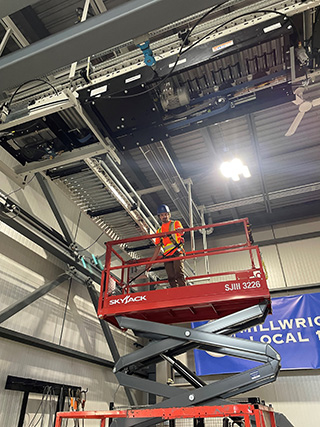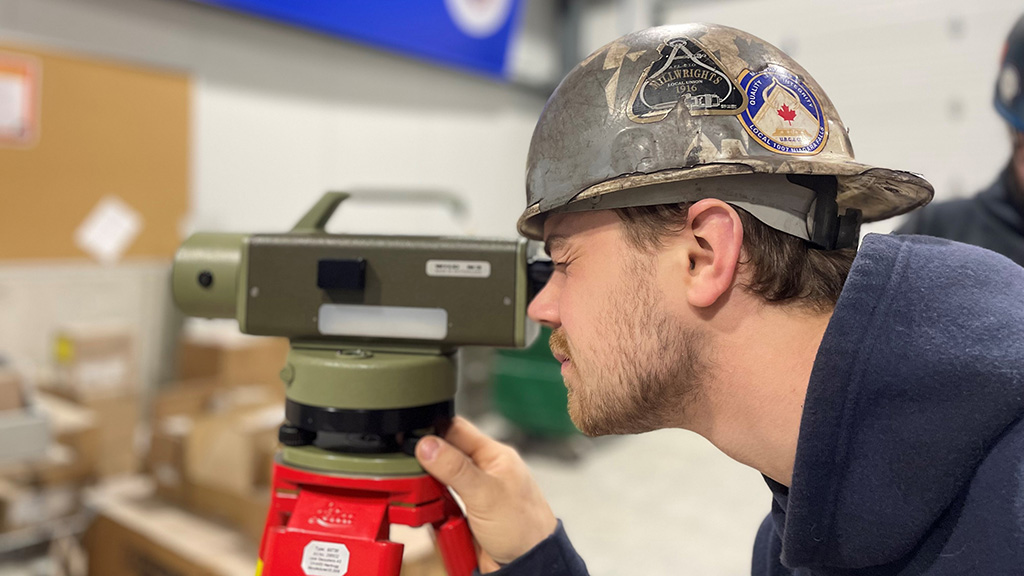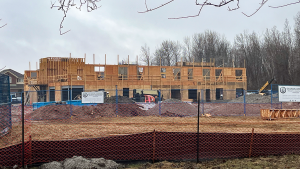Ontario’s Millwright Local 1916 based in Hamilton, Ont. is projecting significant future work for its members so new provincial funding for a training centre expansion and new training equipment is highly welcome says the local’s business manager.
Ontario Premier Doug Ford and Minister of Labour, Immigration, Training and Skills Development David Piccini were in the city recently to announce funding through the Skills Development Fund for four training projects and the Local 1916 building expansion project.
Millwright Local 1916 (formally United Brotherhood of Carpenters and Joiners of America Local 1916) will receive $800,000 to provide hundreds of apprentices and journeypersons with training on laser alignment machines and FARO optics machines.
An additional $250,000 will help the millwrights build a new mezzanine level at its Ditton Drive training centre, improving Local 1916’s capacity for training various technical skills including for welding and optical and laser alignment.
The new build comes on the heels of a previous expansion completed in June 2023. Local 1916 partnered with Ball Construction and SRM Architects to add 4,200 square feet of training space, boosting total footage to near 10,000 square feet.
The price tag for one FARO machine alone is about $500,000, said Local 1916 business manager Brad Sutton, so the provincial funding to buy two of them and three laser alignment machines with demonstration jigs is an important contribution.
FARO machines a big boost
“We went from an office above a bingo hall where you physically couldn’t do proper training to where now training is everything,” he said. “We got this facility and the government funding, it definitely helps us move quickly into something that would (otherwise) take us probably a decade.”
Sutton said the local previously did optical training for surveying and other work using what he termed “total stations.”
“It’s a completely different type of training,” said Sutton. “We got two of those (FARO machines) because one isn’t enough…We just got them not even a month ago, and now we’ve already done two courses of training our trainers.”
“It’s quicker and faster.”
Millwrights are tasked with installing and maintaining industrial machinery. The line between construction and industrial millwright work is now so blurred that new trainees at Local 1916 are referred to as industrial millwrights as opposed to construction millwrights, Sutton explained, with the training programs almost identical.

The March 2024 BuildForce Canada report indicated the demand for millwrights in the GTA will remain tight until the end of 2026 and strong for the rest of the decade.
Sutton said millwrights are key trades in all of the current boom sectors, from auto plant EV conversions and battery plant construction to nuclear plant refurbishments.
When demand for a trade is so high, Sutton said, referring to battery or EV projects in St. Thomas, Cambridge, Oakville and Kingston, the eight locals across the province collaborate constantly to ensure labour force requirements are met.
“Especially in the automotive sector, there’ll be lots coming,” said Sutton. “We’ll be in for a lot of it because of the new battery plants. The new phase that the automotive sector is going through, when you make big changes like that, they have to change everything they do with making a car, and whatever system, automation, machinery, that’s what millwrights do.”
The collaborations are indeed international, he said — Tennessee is currently experiencing a major need for millwright supervisors with Canadians ready to help.
In addition, Sutton as business manager has to ensure local projects such as the major Dofasco green retrofit in Hamilton are staffed, along with responding to ongoing new-project and maintenance needs.
No problems recruiting
Local 1916 currently has 700 active members including 260 apprentices.
The local covers Hamilton as well as Grey, Bruce, Brant and Waterloo counties.
“We millwrights do not have problems recruiting,” said Sutton. “We get lots of people.
“Our apprentices are knockout. We get guys, girls that want to be millwrights. They get it. They’re mechanical people. They love it.”
The government also announced funding to support the purchase and outfitting of four new welding booths at the Iron Workers’ Local 736 training facility.
In addition, IBEW Local 105 is receiving funding for two training projects to help a total of 80 unemployed or underemployed, disadvantaged or underrepresented people gain entry-level electrical skills.
Follow the author on X/Twitter @DonWall_DCN.








Recent Comments